Message from the President: Action on Race on Campus

Members of the Springfield College community:
Monday of this week, Dr. Calvin Hill and I met with the leadership of the four Black student groups, Men of Excellence, Women of Power, Student Society for Bridging Diversity (SSBD), and the newly created Black Student Union, to discuss actions they prioritized to demonstrate progress toward improving the campus climate for BIPOC students. During a second meeting Wednesday night, members of the President’s Leadership Team and Faculty Senate joined me in responding with agreements to move forward on each. The student demands are described below, in their own words, along with the actions that we are putting in motion.
Student Demand #1 - One Credit Anti-Black Racism Course
This class must be offered as a required, one-credit for first-year students on campus. Students at the regional campuses and any other interested students should be able to register. It should provide historical context while looking at ideologies of race and contemporary struggles against anti-Black racism locally in Springfield, nationally and globally.
Action: The faculty will develop a course for credit that will be offered as an elective this spring.
It will be similar in content to those offered at other colleges and universities yet will build on the expertise and experiences of our Springfield College faculty and our mission. This course is not the end of our curricular commitment. We want to make sure that topics in this course are positioned in the larger perspective of the entire Core Curriculum.
Next Step: Student leader Sabrina Williams will be invited to discuss the Core Curriculum with the Provost, Dr. Martha Potvin, the Chair of the Core Curriculum Committee, Dr. Ian Delahanty, and the Director of the Core Curriculum, Dr. Kate Dugan.
Student Demand #2: Develop an explicit no tolerance policy around hate speech:
Currently, our policy does not say anything definitive about consequences for a student openly discriminating against another group. On their first offense, the student should receive education about hate speech through a group developed by the college experienced with diversity and inclusion work. On the second offense, the student should be dismissed.
Action: Share widely the Bias Incident Policy and make clear to the community that we take such behavior seriously while defining hate speech in the context in which it occurs.
A Bias Incident Policy is in place and included in the Student Conduct Policy. It does not explicitly include a zero-tolerance statement, nor does it establish standard sanctions, such as for a first offense. Each case is considered individually and sanctions made based on the outcome of the conduct process. The Bias Incident Response Team is designed to address issues on campus, conduct trainings, and respond to bias incidents on campus. Depending on the severity of the incident, there are different processes available to the team.
Next steps: Atty. Elle Morgan, Dr. Dave Hall, Dr. Patrick Love, and student leaders Kris Rhim and Sabrina Williams will collaborate on defining hate speech and drafting a communication that sends a clear message to the community while protecting student rights. The first meeting will take place after the upcoming Board of Trustees meeting.
Student Demand #3: Hire a Black Counselor in the Counseling Center:
Facing racism and microaggressions on campus each day and then being asked to share our traumas impacts all of us, but there aren't many people to talk to who share our experiences and understand us. This person should create group therapy workshops and individual counseling sessions offered to BIPOC students by BIPOC staff trained in race-based trauma.
Action: Three steps are underway.
Dr. Patrick Love is working to establish a Memorandum of Understanding with a local therapist, who is a Black woman, who recently opened her own practice. A grad intern, who is a Black woman, is currently working in the Counseling Center. The search for a full-time therapist, titled Clinical Coordinator/Diversity Specialist, has been relaunched, with an expanded recruitment plan to increase visibility of the opportunity in professional communities of color.
Next steps: Dr. Patrick Love will share the position description with the students for review and feedback. Student leader Raj Omoru volunteered to be on the search committee.
Student Demand #4: Funding for the Office of Multicultural Affairs:
Before the school decided to hold conversations on race and give Black and brown students performative support, this office has been home for us. Give this office more money. The office has less funding than some clubs and has been asking for an increase for years. We do not care about other office funding or similar offices at other schools' budgets. When we ask admins for things to be done, the question is always that you all need money to happen. For the OMA office to adequately serve marginalized students, they need money.
Action: A Multicultural Programming Fund with $50,000 was created Wednesday morning.
The Fund will be administered by the Vice President for Inclusion and Community Engagement, the Director of Multicultural Affairs, and the President of the Black Student Union to enhance campus diversity programming.
Next Steps: Dr. Calvin Hill, Ms. Felicia Lundquist, and student leader Raj Omoru will meet to determine criteria for funding.
Student Demand #5 - Honor protestors:
Create a plaque that displays in the campus union that explains the student takeovers from '69 and '70 protests and a social media post that does the same. The students who were on probation and protested again in 1970 were asked to leave the college. Many of those students got degrees elsewhere, but some did not. Give the students who didn't get their degrees an opportunity to earn them, whether with a paper detailing the protests or something else. The school has sent out emails and posted in support of change agents, such as John Lewis and Ruth Bader Ginsburg. We need to treat the social justice advocates on our campus with grace and honor as we do with those who do the national scale and have passed.
Action: We will have a resolution by the end of the academic year.
Dr. Ian Delahanty, with support of a CIC grant, is researching the protests to better understand what transpired and who was involved. Grant funding was halted by CIC due to the pandemic and the funds were provided by the College so the project was not delayed. With Dr. Delahanty’s research, we can investigate the options available for those who were dismissed as a result of the protest.
Next step: A meeting with alumni of color is scheduled for 10/4 to learn more and to discuss a permanent recognition of the protests. One suggestion that has been shared is a plaque with the names of the students involved.
Student Demand #6: High profile speaker for SEAT at the Table
Action: An invitation has been made.
Dr. Calvin Hill and Ms. Felicia Lundquist have invited a local activist to participate. Other options are being pursued, including those speakers recommended by our student leaders. In addition, the President’s Leadership Team and the student leaders will meet monthly, beginning after SEAT at the Table in October.
I appreciate the conversations with student leaders who have advocated for immediate and demonstrable actions. Our conversations will continue and we remain committed to action.
Sincerely,
Mary-Beth Cooper
Springfield College President

